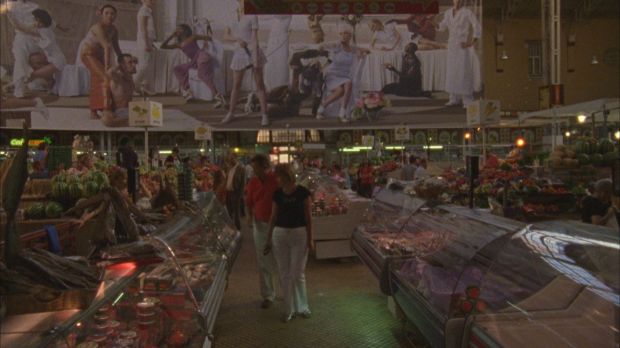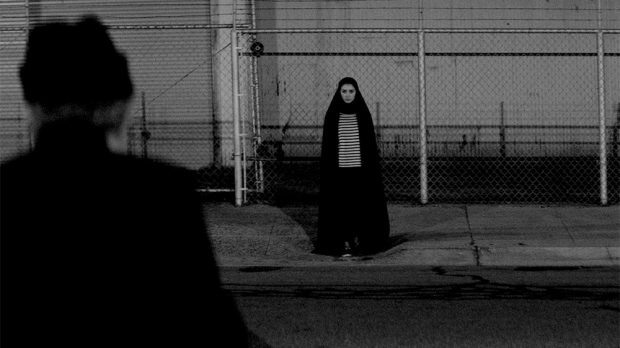
Dear White People (Simien, 2014)
It’s hard to comment on the ideas being explored in Dear White People, as I’m so far removed from them. As a white Brit I can only listen to director Justin Simien and take him for his word, but suffice to say that this satire, cartoonish in style though it may be, rings very true about racism in the US, particularly amongst the middle classes. Its Ivy League campus setting proves to be a fantastic sounding board for myriad ideas, and its exploration of the black experience – particularly the performance of race and the various ways that black people find to survive and assimilate into a predominantly white world and the politics of this – feel illuminating and vital.
It’s also very funny, and Simien has a remarkable amount of visual flair and ambition for a first-time director. Spike Lee will inevitably the first point of comparison, but he also touches on Kubrick in his framing and Altman in the way he deftly handles his huge cast of characters – all of them broadly written but as clear as a bell. The cast are uniformly excellent, but Tessa Thompson as the righteous-but-vulnerable Samantha White emerges a true star. One can only hope that Hollywood will find more roles for women of colour so we can see her shine again.
The Vanquishing of the Witch Baba Yaga (Oreck, 2014)
This ravishing, poetic essay-film about the tension between the traditional and the modern in Eastern Europe, with its focus on mushroom foraging and folklore, is rendered all the more fascinating when you discover that its director, Jessica Oreck, is American, and this film is much more of an anthropological study than anything rooted in personal experience. Either way, it’s a hypnotic exploration of man’s interactions with nature and the traditions that keep a culture rooted in the land that it comes from, even in the wake of a century fraught with conflict.
The animated fairytale that she scatters in counterpoint throughout her film is lovingly rendered and has a clear purpose in illustrating the kinds of stories her subjects were raised upon, and her most powerful images, particularly those of the nearly abandoned, Chernobyl-adjacent Pripyat, with its overturned libraries and decaying ferris wheels, are indicative of a culture that had its heart ripped out attempting to rediscover its roots.
White God (Mundruczó, 2014)
There was a lot of laughter in the screening of White God I attended, but I suspect that there were few moments of intentional comedy in the film itself. In fact, it may have been one of the most earnest films in the entire festival. The tale of a dog that gets put through the wringer after been separated from his loving owner and emerges as the leader of a doggy uprising against humans, this Hungarian film by Kornél Mundruczó somehow won the Un Certain Regard prize at Cannes, despite being tonally baffling and ill-thought out in its internal logic.
The problem is that it tries to have it both ways when it comes to its canine protagonist, Hagen: he maintains his doggy instincts throughout but also seems to have the heart and mind of a human, meaning that we never feel on solid footing with our main character, who in one scene will be successfully conditioned into a snarling prize fighter, and in the next will seem so human you half expect him to start talking. Images of huge packs of dogs terrorising the populace are a lot of fun, but even in its satisfying third act the film is fraught with coincidences and ill-thought-out plot developments. Absolutely the best dog performance of the year, though.
A Girl Walks Home Alone at Night (Amirpour, 2014)
Billed as “The first Iranian vampire western” (though mostly American in design) LA-based Ana Lily Amirpour’s truly distinctive debut feature has bags of style and poise. Set in the fictional Iranian town of Bad City and shot in moody black-and-white, it tells the story of a lonely vampire (Sheila Vand) slowly falling in love with the hapless Arash (Arash Marandi), A Girl Walks Home Alone at Night spends most of its time skulking through dark, lamplit streets and dim, decaying apartment buildings, to great effect. Amirpour devotes most of her time to shooting her lead actress with all the attention her astonishing performance deserves, and the film’s best moments are the ones where little happens and the film’s pervasive, lonely-romantic mood is allowed to take over.
The problem is that Amirpour seems more concerned with cool than she is with story, so the film falls flat when things have to happen. Early scenes involving a pimp drug dealer are far too broad to fit into the rest of the film, and the film’s actual plot is so ineffectual that it drags the more powerful, plotless sequences down with it. This film is based on an earlier short of Amirpour’s, and one can’t help but feel that there wasn’t quite enough material here for a whole film. Nonetheless, it’s a striking, satisfyingly unusual film and a director to look out for in the future.


